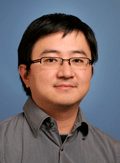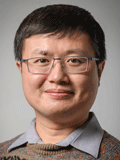ISQED'23 Embedded Tutorials
Chair & Moderators:
Vita Pi-Ho Hu - National Taiwan University (Chair)
Xiaolin Xun -Northeastern University(Co-Chair)
Tutorial 1
Wednesday, April 5, 12:25PM-1:25PM
Design Automation for Learning-Enabled Cyber-Physical Systems
Presenter:
Prof. Qi Zhu, Northwestern University
 Qi Zhu
Qi Zhu Abstract: Future learning-enabled cyber-physical systems (LE-CPSs), such as self-driving cars and robotic systems, will employ complex machine learning-based sensing, computation and communication components for their perception, prediction, planning, control, and coordination. However, ensuring their safety, robustness and security faces tremendous challenges, given the highly dynamic and uncertain environment they operate within, the fast increase of their functional and architectural complexity, the difficulty in analyzing deep neural network-based components, and the often-stringent resource and timing constraints. This calls for new design automation methodologies and tools that support rigorous, accurate and efficient modeling, synthesis, verification, and adaptation of LE-CPSs. In this tutorial, using connected and autonomous vehicles (CAVs) as an example, I will discuss these challenges and present some of our recent work to address them in a holistic manner, including 1) end-to-end verification, design and adaptation methods for ensuring robust and safe application of neural networks in perception and decision making; and 2) cross-layer methods based on weakly-hard paradigm for mitigating execution disturbances (e.g., timing violations, soft errors, malicious attacks).
About Qi Zhu
Qi Zhu is an Associate Professor at the ECE Department in Northwestern University. He received a Ph.D. in EECS from University of California, Berkeley in 2008, and a B.E. in CS from Tsinghua University in 2003. His research interests include design automation for cyber-physical systems (CPS) and Internet of Things, safe and secure machine learning for CPS and IoT, cyber-physical security, and system-on-chip design, with applications in domains such as connected and autonomous vehicles, energy-efficient smart buildings, and robotic systems. He is a recipient of the NSF CAREER award, the IEEE TCCPS Early-Career Award, and the Humboldt Research Fellowship for Experienced Researchers. He received best paper awards at DAC 2006, DAC 2007, ICCPS 2013, ACM TODAES 2016, and DATE 2022. He is the Conference Chair of IEEE TCCPS, and VP of Young Professionals at IEEE CEDA. He is an Associate Editor for IEEE TCAD, ACM TCPS, and IET Cyber-Physical Systems: Theory & Applications, and has served as a Guest Editor for the Proceedings of the IEEE, ACM TCPS, IEEE T-ASE, Elsevier JSA, and Elsevier Integration, the VLSI journal.
Tutorial 2
Thursday, April 6, 1:05PM-2:05PM
Introduction to Quantum Computing: from Algorithm to Hardware
Presenter:
Prof. Hiu Yung Wong, San Jose State University
 Hiu Yung Wong
Hiu Yung Wong Abstract: Quantum computing is expected to change the world by providing exponential speed-up in solving some very difficult problems. In this tutorial, we will first discuss the fundamental principles of quantum computing algorithms. We will run one of the basic quantum algorithms, the Deutsch algorithm, on IBM’s quantum computer to further appreciate the origin of speed-up and the limitations in quantum computers. Error correction, which is essential to realize a fault-tolerant quantum computer, will be briefly covered. Finally, using the superconductor-based quantum computer as an example, we will study how to implement the essential operations in quantum computers, namely, qubit initialization, readout, and manipulations. It will be appreciated that powerful classical computers, which are used to control the qubits, are essential to the successful implementation of quantum computers.
About Hiu Yung Wong
Hiu Yung Wong is an Associate Professor and Silicon Valley AMDT Endowed Chair in Electrical Engineering, at San Jose State University. He received his Ph.D. degree in Electrical Engineering and Computer Science from the University of California, Berkeley in 2006. From 2006 to 2009, he worked as a Technology Integration Engineer at Spansion. From 2009 to 2018, he was a TCAD Senior Staff Application Engineer at Synopsys.
He received the Curtis W. McGraw Research Award from ASEE Engineering Research Council in 2022, the NSF CAREER award and the Newnan Brothers Award for Faculty Excellence in 2021, and Synopsys Excellence Award in 2010. He is the author of the book, "Introduction to Quantum Computing: From a Layperson to a Programmer in 30 Steps". He is one of the founding faculties of the Master of Science in Quantum Technology at San Jose State University.
His research interests include the application of machine learning in simulation and manufacturing, cryogenic electronics, quantum computing, and wide bandgap device simulations. His works have produced 1 book, 1 book chapter, more than 100 papers, and 10 patents.

